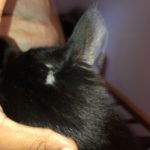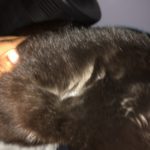Hi there-
I hate to sound gross, but was her food fully digested? Was the event close to when she was finished eating? If that is the case, she may have just eaten to fast. Also- have you switched foods? Sometimes that can upset a stomach. If she is acting normally and going to the bathroom and being her normal self, I would just keep an eye on her and make sure she stays that way. Any sudden change, I would call the vet. If you have an appointment soon, I would mention it to them.
I’m seeing articles popping up online stating that plastic storage containers for dog food are bad because of air getting to the food and causing bacteria. Is this true?
Comments
My one year old cat threw up twice on August 23rd, but she was not acting lethargic and was still eating and drinking normally so I thought she maybe threw up because of a hair ball. She threw up again today twice, with one being a very small amount. She is not acting lethargic and is active and playing. She is also drinking normally but she has not eaten as much as normal. Both times she threw up when I was not at home. She did start eating when I got home today though. I also free feed her but haven’t had issues with her vomiting due to eating to fast or vomiting in the entire time I have had her (one year). I’m not sure what the cause of her vomiting could be.
Comments
7 month old puppy has raw skin possible on upper lip.
Does anyone know if I should be concerned or if this will take care of its self. I just noticed it today.( It was not there before)
Comments
My 4 month old border collie mix was spay 9 days ago. On day 7 she had a swollen lump under her incision site. I took her to her vet yesterday and it was determined to be a seroma and they said to continue her on crate rest for several more days. I have read that it can take a month or more for a seroma to go down and the fluid reabsorb. She is by nature an extremely active puppy. We play outside for with her for a couple of hours most days, where she fetches balls, frisbees, etc and runs like crazy. We were hoping that after 10 days we could get back to playing. How long do you recommended we wait. The fluid filled lump is about the size of a lemon.
Comments
Hello, I am very interested in getting a dog, however where I live I might have an issue with our neighbours. They have two dogs, both primarily live in their back garden, they have had them for about several years and have never taken either of them for a walk. Whenever I go into my back garden they start barking incessantly, they are often left alone for hours despite one of the couple who live there not working. Would still be possible for me to get a dog, take it into the garden for toilet-training and to play under these circumstances?
Comments
Please help!
My soon to be 11 year old shnoodle (6 pounds) has to follow me around everywhere. We moved to a new house about two months ago and she has went pee on the stairs, bedroom and hallway at the new house. I finally had to gate the stairway and confine her to first floor only. Which has hardwood floors. She crys the whole time I’m upstairs getting ready for work or folding laundry. I’ve been crating her with my other dog at night and all she does is whine cry and scratch at blankets, the bed and metal bars on crate. Yesterday I went and bought her a crate of her own because I thought maybe she just didn’t have enough room to lay down with being in the same crate as my other dog. Well it was the same old thing last night plus she pooped in her pin and this afternoon pooped right by the pin after she had just been outside. I’m afraid she’s going to her herself too by scratching those metal bars. I tried a mesh crate and she got her toenail stuck in the mesh material and I had to cut the material to get her lose. Any thoughts on what I should do? I’ve tried crating her in my room but she doesn’t sleep she just whines, crys and scratches… PLEASE HELP!!!
Thank you
DeAnna
Comments
My cocker spaniel is 18 months old. Only one of his testicles dropped and he had what we thought was a retained one. He went in to be neutered today and after two hours under the vet couldn’t find the other ball!
He will do a blood test in a few months to check for testosterone. If there’s none then it looks like he only ever had one but if there is hormone then it’s in there somewhere.
I’m worried sick as the reason we got this done was retained testicles are at a higher risk for cancer. Has anyone experienced this with their dog? Did the dog go on to be okay?
Comments
The dog groomer suggests our Norwich Terrier takes medicine prior to grooming appointment. She bites the groomer. She originally went to this groomer and they only had problems cutting her nails. We went elsewhere and our dog bit at the groomer and they called me to come pick her up mid grooming and they couldn’t finish her. We went back to the present one who completed that cut. She went back today and got groomed but they said she needs meds next time. She is 7 yrs old and a rescue. We have had her almost 2 yrs. She sometimes nips at us too. Suggestions about meds please. Thanks.
Comments
Eww gross! This morning, I saw one of the dogs nosing in the dirt and figured that he smelled cat poop- I said “no” and he left it but ran straight back when I turned to continue walking everyone. So I ran back to make sure he didn’t eat it (why is cat poop a delicacy to dogs?????) and I saw him with a leopard slug in his mouth. Ugh! I don’t know what is worse? He did not eat it- he dropped it. I’m guessing that he probably has eaten them before. Are they dangerous or just protein?
Comments
My cat has been scratching her neck and behind her ears lately (which is normal), but when i watched her do it, today, clumps of her hair came out. I looked at her fur and noticed a couple kinda bold spots. Her skin isn’t red or anything, you can just see her skin more. I am wondering if this is just a shedding thing or if something else is wrong. I live in Illinois so weather is pretty average, and my cat is an indoor cat. She has been throwing up a lot lately, but i think thats just because she eats so fast. She also is allergic to some food. The vet said she is allergic to the protein in some types of meat, she will get red spots on her face and ears but after trying a couple types of food i think the rash is mostly gone. I really hope this is a normal thing but i am not sure. The bold spots keep getting worse with every scratch. What should i do?














Hello,
I’ve seen the same in human health too. I’ve heard (and I’m not an expert on this) that it’s especially concerning if left in sunlight, high temps or in the container for extended periods of time. In general I will say that I try to avoid plastic. I prefer ceramic or stainless steel. I keep my pets food in the bag in a wooden feed bin with a lid. I clean it out every few weeks to keep the spilled food from attracting bugs.
Xox to Axle and the family. (I think that’s you. Hope so).
Thanks! Very helpful 🙂
And yes that’s us 🙂
I keep all dog food in my house inside cat litter bins in their original bags, if possible. I’ve also been known to transfer to smaller bags (since we get the BIG bags). In the latter situation, said bags always have zip seals and are thrown away once empty. We keep the bins out of the sunlight and clean THEM regularly, too, to ensure no old food remains.